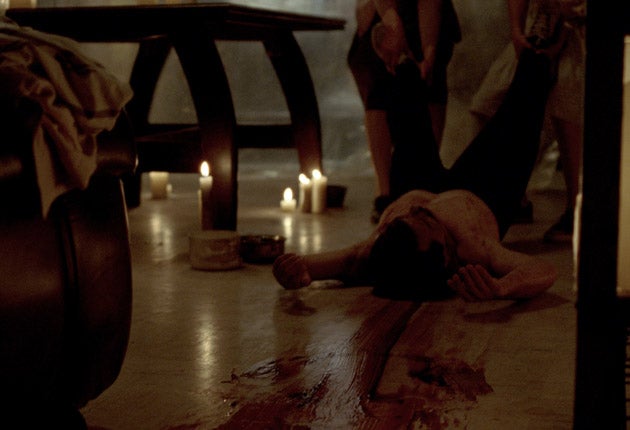We Are What We Are, Jorge Michel Grau, 90 mins (18)
If this family invites you round for dinner, stay home and wash your hair

There's a scene early on in We Are What We Are, when the two brothers Alfredo (Francisco Barreiro) and Julian (Alan Chavez) go on the prowl.
Their father has died on the streets of Mexico City. They, and their mother and sister, have been left to fend for themselves. "We have to get something for tomorrow," they tell each other, several times. (Get what? Get money? Get food?) Then this changes to "We have to get someone for tomorrow." (What for? A football match?) The boys walk to the bridge, where we see them nerving themselves for what they do next. And suddenly they explode into action.
Julian runs into a group of teenagers squatting under a bridge, grabs a small child in their care, and makes off with it. Alfredo does the same with another, clutching it under his arm like a prize pig at a fair. The teenagers leap to their feet to give chase .... And, abruptly, we're watching one of those breathless Life on Earth scenes on the Masai Mara, as a bounding cheetah pursues a baby zebra and brings it down, fangs sunk into its hindquarters. Except that these predators are human beings. And brothers. And cannibals.
It had to happen, I suppose. After vampire movies, cannibals are the logical next step as screen heroes. These guys don't just suck blood and make you their slave for eternity. They eat you up, so that your guts, brains, hands, feet and sex organs are all inside them. Now that's what I call an all-consuming relationship. From the evidence of this film, though, cannibals don't have much to recommend them.
The brothers are good-looking, but mostly silent. The younger, Julian, is borderline psychotic. The elder, Alfredo, is unable to stand up to his mum (Carmen Beato). The sister, Sabina (Paulina Gaitan), is an absolute whizz at cracking open a cadaver. Trust me, if this family invites you to dinner, stay home and wash your hair.
Writer-director Grau's debut feature is a film of two halves. For the first, it's all cool understatement, minimal dialogue, worried glances. The only sound, apart from rasps of cello, is the ticking of clocks, for the deceased father was a watch repairer. When they realise he's dead and go about finding food, things speed up: two corrupt policemen are on the case, a sisterhood of tottering whores objects to the abduction of one of its number, and the family squabbles about the ethics of eating certain people.
In the midst of this increasingly fraught action, Grau tries to inject some grace notes about impulses, despair and optimism. A dismal song, "Life is Hopeless", is counterpointed by a woman on the bus thanking God her son has made it to university and handing out inspirational notes to other passengers. And Alfredo, seeking the makings of a family supper in the darkened streets, follows a come-hither-ish blond gang leader into a gay club, and cops his first big kiss.
I know what you're thinking: hasn't the boy got enough on his plate without sexual orientation issues? On the dance floor, his new beau warns him to watch out because – he waves a hand at the others – "these wolves will gobble you up". I think Mr Grau is trying to suggest here some broader perspective about the predatory nature of society. But it's a little perfunctory, when the film dotes with such relish on the grisly business of treating men as meat.
Things hit a low mark when a corpse is lifted by the use of two meat hooks, one plunged into the chin and the other into the groin, and we get a hard-to-watch-and-even-harder-to-listen-to scene of dismemberment. You have to admire the commitment to the logic of the abattoir, but it's not wholly original. I remember a 1974 movie about a cannibal family with a similarly nasty batterie de cuisine. It was Texas Chainsaw Massacre, an infinitely better film.

Watch Apple TV+ free for 7 days
New subscribers only. £8.99/mo. after free trial. Plan auto-renews until cancelled

Watch Apple TV+ free for 7 days
New subscribers only. £8.99/mo. after free trial. Plan auto-renews until cancelled
The trouble is that the basic premise is so risible, and the treatment so earnest, that nit-picking questions assail you. Must the family eat human flesh to avoid starvation – or could it settle for steak tartare? Did Dad die after eating someone who disagreed with him? How will the hospital-bound cannibal answer queries about dietary requirements? Very childish of me, I know. But when you're faced with such grim, squalid and relentless fare, a giggle is a vital survival tool.
Next Week:
Jonathan Romney on Uncle Boonmee, the Thai film that won the Palme d'Or in Cannes: amazing, delirious and nuts
Subscribe to Independent Premium to bookmark this article
Want to bookmark your favourite articles and stories to read or reference later? Start your Independent Premium subscription today.

Join our commenting forum
Join thought-provoking conversations, follow other Independent readers and see their replies